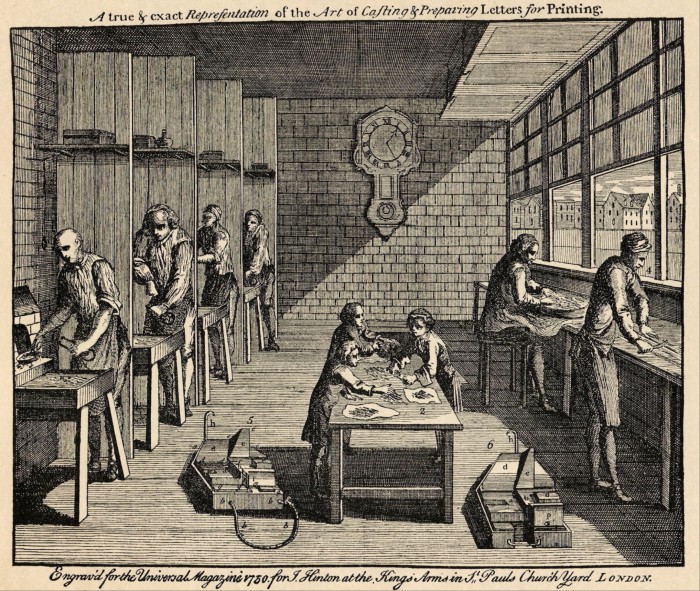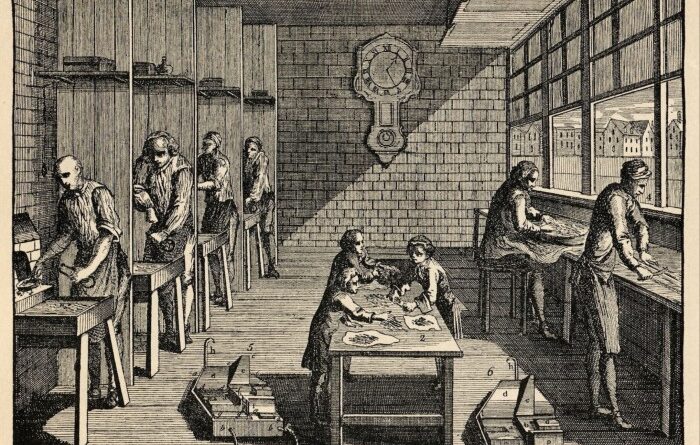The Book-Makers by Adam Smyth – a celebration of the printed book
Unlock the Editor’s Digest for free
Roula Khalaf, Editor of the FT, selects her favorite stories in this weekly newspaper.
The history of the book is often associated with a list of the best songs ever. Scholars have traditionally focused their attention on important milestones, pausing first at Gutenberg’s Bible of 1455 and Shakespeare’s First Folio (1623); then on to Diderot and d’Alembert’s Encyclopedia (1751-66) before arriving at William Morris’s Kelmscott Press The Works of Geoffrey Chaucer (1896). Between them these volumes tell variously the story of the invention of movable type, the development of the English letter book, the book as a repository of Enlightenment thought and the wonders of the Bible in 19th century printing. .
This is a triumphant and captivating story; and one that Adam Smyth appreciates Bookmakers produces another version. On the flipside, he writes, “is the world of job publishing: the production of cheap, everyday, often ephemeral publications, a trickle of non-book publishing that has swept the world since the -1450”. The pink paper (or pink screen) you’re reading on now is a living part of that story: a testament to how books once formed a small part of the crowded space that is print culture.
With this renewed understanding of progress in mind, Bookmakers explores the lives of several men and women who each contributed something unique to the history of this book. The story they tell together is not one of the continuous development of technology but the drama of making and fixing the concept of the book itself.
The scene begins in the Fleet Street printing shop of Wynkyn de Worde, a Dutchman who demonstrated the power of the printing press in England, printing almost all extant Middle English literature. From de Worde’s course we move to the almost invisible history of Wildgoose the binder – a man whose character can only be seen in the form of his sewing and hatching – in the lives of Mary and Anna Collett, Jacob’s sisters who they cut up the printed Bibles. so that they can translate the words of the Gospels into new types of religious records.
The Colletts are the first of several Smyth booksellers to stand outside the official production and publishing history. Others include those involved in 19th-century ‘Grangerizations’ (a form of cutting and pasting named after James Granger, the preacher who pioneered the format), and the foundation of publications small ones like Hogarth Press like. as well as the world of contemporary tradition making. Clear accounts suggest that Smyth’s sympathies lie with manual forms of bookmaking, in which method and purpose defy industrial power.
So he tells the story of Thomas Cobden-Sanderson, who was so determined to keep his Doves Press publications out of the press world that in 1913 he threw his entire type from Hammersmith Bridge into the River of the Thames. Even a gesture of this scale cannot protect Doves Press from the power of the internet world. In 2014 a staggering 148 species were found by a licensed mudlarker and assisted by divers from the Port of London Authority. The genre has therefore been digitally translated: “with modifications”, Smyth writes, “for the modern, web-accustomed eye.”

Bookmakers it offers many exciting things for Bible journalists. I didn’t know, for example, that the paper used in the UK and the US for making books travels in different directions, nor that this is why American books lie more than their English cousins many.
And in a world where digital writing calls out more than ever it’s refreshing to be reminded of the ideas and wisdom of generations of men and women, many of them overlooked by regular history, who helped expand the potential of the printed book as form and substance. . Their content lives in the physical books they created. By carefully studying the physical properties of the volumes, Smyth breathes the books-like objects and their creators back to life.
The Book-Makers: A Book History through the Remarkable Lives of 18 by Adam Smyth Bodley Head £25, 400 pages
Join our online book group on Facebook at FT Books Café and subscribe to our podcast Life and Art wherever you listen
#BookMakers #Adam #Smyth #celebration #printed #book

